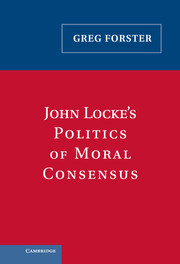Book contents
- Frontmatter
- Contents
- Acknowledgments
- List of Abbreviations
- John Locke's Politics of Moral Consensus
- 1 “Reason Teaches All Mankind, Who Will But Consult It”: John Locke and Moral Consensus
- 2 “Sit Down in Quiet Ignorance”: Locke's Epistemology of Limits
- 3 “The Candle of the Lord”: Locke's Rational Faith
- 4 “The Only Foundation of Faith”: Reasonable Christianity
- 5 “The Only True Touchstone of Moral Rectitude”: The Religious Foundations of Morality
- 6 “'Tis Reasonable to Think the Cause Is Natural”: Locke's Religious Eudemonism
- 7 “The Servants of One Sovereign Master”: Authority and Moral Consensus
- 8 “The Opinion of This or That Philosopher Was of No Authority”: Locke and Us
- Notes
- Bibliography
- Index
7 - “The Servants of One Sovereign Master”: Authority and Moral Consensus
Published online by Cambridge University Press: 17 August 2009
- Frontmatter
- Contents
- Acknowledgments
- List of Abbreviations
- John Locke's Politics of Moral Consensus
- 1 “Reason Teaches All Mankind, Who Will But Consult It”: John Locke and Moral Consensus
- 2 “Sit Down in Quiet Ignorance”: Locke's Epistemology of Limits
- 3 “The Candle of the Lord”: Locke's Rational Faith
- 4 “The Only Foundation of Faith”: Reasonable Christianity
- 5 “The Only True Touchstone of Moral Rectitude”: The Religious Foundations of Morality
- 6 “'Tis Reasonable to Think the Cause Is Natural”: Locke's Religious Eudemonism
- 7 “The Servants of One Sovereign Master”: Authority and Moral Consensus
- 8 “The Opinion of This or That Philosopher Was of No Authority”: Locke and Us
- Notes
- Bibliography
- Index
Summary
The all-important problem for politics is authority. Who has legitimate authority to rule, and on what terms? This problem arises most acutely where the political community is fragmented. If a community shares a common culture, religion, and worldview, the question of authority is not likely to be urgent, as there will probably be broad agreement on the identity of the authoritative ruler and the terms of his authority. But a society characterized by deep tensions between members of different cultural groups does not begin with a shared account of authority. If it is to survive as a unified political community, it must provide a persuasive argument in favor of its rulers' authority to rule, and the terms on which they rule. Otherwise members of one or another group may cease to view the political community as legitimate.
Building an argument that will simultaneously appeal to members of different religions and cultures is a difficult task. For Locke, shared political authority among different cultural groups is possible because, and only because, human beings are “all the servants of one sovereign master, sent into the world by his order and about his business” (T II.6, 117). Since all human beings are under God's authority, a government built upon God's law can serve as a binding authority on all people. Despite the conflict religion frequently causes within society, it is precisely through our submission to the divine that Locke builds a common political community.
- Type
- Chapter
- Information
- John Locke's Politics of Moral Consensus , pp. 218 - 258Publisher: Cambridge University PressPrint publication year: 2005



